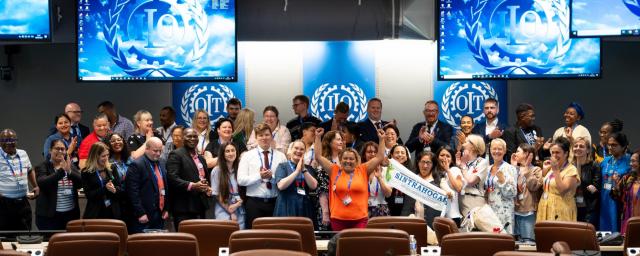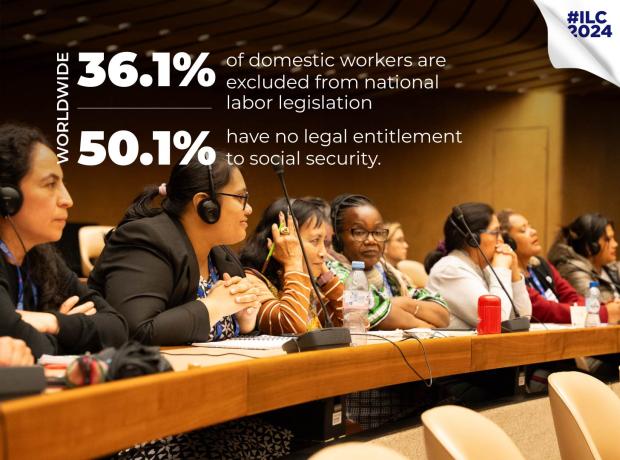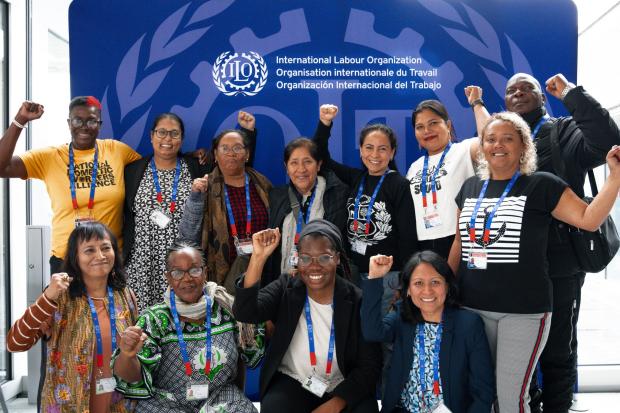
Photo courtesy of International Domestic Workers Federation
Domestic workers have long carried the weight of households, families, and societies on their shoulders, often in silence and invisibility. For decades, their labour was undervalued and their rights denied. That began to shift in 2011, when the International Labour Organization adopted Convention 189 (C189), finally recognizing domestic work as real work deserving dignity, justice, and protection. In this blog, Raina Bhattacharya, takes us through this journey - from the struggles and triumphs of domestic workers on the frontlines of change, to how C189 continues to inspire organizing and advocacy across Asia today.
The International Domestic Workers Federation (IDWF) has been at the forefront of many advocacy efforts, not excluding protests, demonstrations, and powerful acts of resistance, concerning the rights of domestic workers across the world. As of December 2023, the IDWF is made up of 93 affiliates from 69 countries, serving a membership of over 669,000 domestic/household workers’ members. Most are organized in trade unions and others in associations, networks and workers’ cooperatives. Since its inception as a network in 2008 (the Federation was officially formed in 2013), the IDWF has advocated for the rights of domestic workers globally: we believe domestic work is work, and all domestic workers deserve to enjoy the same rights as all other workers.
For the IDWF, our story of global advocacy started in 2006, when leaders of some key domestic workers’ organizations from across the world met and decided to fight for worldwide recognition as workers. Since then, domestic workers have been determined to mobilize domestic workers and their allies worldwide to win an International Labour Convention to protect the rights of domestic workers.
The International Domestic Workers Network (IDWN), formed in 2009, carried out various advocacy measures regionally and internationally, and organized domestic workers in various regions and countries to this end, supported by the International Union of Food, Agricultural, Hotel, Restaurant, Catering, Tobacco and Allied Workers Associations (IUF), Women in Informal Employment and Global Organizing (WIEGO), and GLI (Global Labour Institute). In June 2011, the International Labour Organization (ILO) C189 Convention for Decent Work for Domestic Workers was adopted in the International Labour Conference, a huge and historic achievement for domestic workers and the entire labour movement.
This historic day was June 16th, which is now celebrated every year globally as the International Domestic Workers Day (IDWD).
"Today we celebrate a great victory for domestic workers. Until now we have been treated as ‘invisible’, not respected for the huge contribution we make in society and the economy and denied our rights as workers. It is an injustice that has lasted too long.”
Since then, the IDWF and its affiliates have been mobilizing domestic workers to advocate for C189 ratification and labour law reforms to recognize domestic workers’ rights as workers. Domestic workers are using the ILO conventions as advocacy tools - not only the C189 on domestic workers, but also the ILO Fundamental Rights at Work, Violence and Harassment Convention C190 and so on. The IDWF engages in social dialogues of labour laws and standards at all levels - from local, national, regional to international including the ILO.
The C189 has been a rallying cry for domestic workers around the world ever since its inception. For the first time, the C189 ascertained rights for domestic workers such as access to freedom of association and right to collective bargaining, elimination of forced labour, access to minimum wage not lesser than what is accorded to other workers, protection from violence and harassment, standard contracts, access to normal hours of work, weekly rest and sick leaves, access to social protection, thus entrenching the idea that domestic workers are workers. It further reinforced that domestic workers have rights to decent work and social protection.
In Asia, the convention has served as a model for how a comprehensive legal framework for domestic workers rights and protections can look like. The Philippines has ratified C189 and has a Batas Kasambahay (Domestic Workers) law that guarantees rights and protections to domestic workers in the Philippines, including minimum wage protection, standard contracts and social protection. In Nepal, the Labour Act 2017 does include domestic workers as workers, although their access to minimum wage and social protection remains limited due to practical issues on the ground.
And while other countries in Asia have not ratified C189, for domestic worker unions and organizations in Asia, the C189 serves as a standard to organize and advocate for rights that can be gained for domestic workers. For example, the Indonesian Parliament currently has tabled a Domestic Workers Bill. In Malaysia, migrant domestic workers have been included under SOCSO, the social security program for workers. And IDWF affiliates, AMMPO and PERTIMIG have been recognized by PERKESO, the social security authority, to have regular meetings on SOCSO implementation.
This also means that the organizing and advocacy push to guarantee the rights of domestic workers nationally and locally needs to continue vigorously in Asia. And this is where the presence and inclusion of domestic worker organizations and leaders in multilateral spaces play an important role in influencing policy.
According to ILO estimates, domestic workers are 25% of the care workforce, making them a major stakeholder in the care economy, and whose realities, rights and responsibilities will need to be taken into due consideration for a robust care policy. Even within the ILO’s 5R Framework for Decent Work, one of the most important “R” is Represent: allowing domestic workers to form their own unions and organizations by granting them access to freedom of association and right to collective bargaining. And following that, domestic workers unions and organizations must also be included in multilateral spaces and dialogues around the care agenda, where their voices can be heard and their realities taken into account in policymaking.
For the IDWF, the C189 also continues to function as a fundamental Care convention, which must be ratified by governments who are seriously considering building a resilient, inclusive and sustainable care economy. And in instances of international accountability such as the review of UN Member states by the Committee on the Elimination of Discrimination against Women (CEDAW), the Committee suggests Member States to ratify and adopt C189 as domestic legislation, as a way of protecting the rights of both local and migrant domestic workers.
At the International Labour Conference, workers have a voice: the ILO has a tripartite structure which consists of workers, employers and governments, with rights to vote. In collaboration with global union federations (GUFs) and other unions representing workers, the IDWF and domestic workers get an opportunity to voice their concerns through the worker representatives and discuss collectively with worker leaders on their stance about various aspects of the standard setting processes of the ILO.
As unions, we desire that spaces for advocacy and dialogue should have a tripartite structure where workers are heard effectively, have a voice and have equal access to representation. In such spaces, the aim remains to create a consensus between all participating entities, and if not, all entities have a right to dissent through voting. For domestic workers, multilateral spaces of discussion and negotiation are important points of intervention, where their voices and stories need to be heard to make sure that they are not left behind, and they continue to assert their rights as workers.

This blog has been developed by Raina Bhattacharya, Program Officer for Asia, International Domestic Workers Federation (IDWF); with inputs from Fish Ip, Regional Coordinator for Asia, IDWF; and Grace Huang, Secretary General, Domestic Caretakers Union (DCU), Taiwan.

